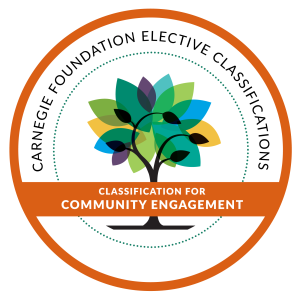What is Carnegie Community Engaged Classification?
The classification is a national comprehensive self-study that asks us to audit, assess and advance how we strategically implement community engagement across our mission and function - research, discovery, student learning, engagement/service partnerships and their impacts - at campus and unit levels.
Why Are We Doing This?
- Celebrates our History and Identity, from the Wayne Commission which created VCU as an Urban serving institution to being awarded the first Carnegie Community Engaged Classification in 2005 when the program was launched, then reclassified in 2015.
- Honors our Strategic Commitments and Holds us Accountable to the community, our community partners and our principles and values documented in Quest 2028 Thriving Community Goals, VCU Health’s Quest 2028, OVPRI’s research priorities and individual unit commitments.
- Achieves our Goals, Current Work and Outcomes including transformative learning, internships, partner priority communities, the Repositioning Task Force.
- Helps us to Adapt to our Changing World, where the public is questioning the value and role of higher education.
What is the Timeline?
- February-March 2024 - Consolidate Infrastructure/Create data collection tools
- April-September 2024 - Data Location and Collection
- July-October 2024 - Data Analysis and Narrative Development (Meaning Making)
- September-December 2024 - Writing the Application
- January-February 2025 - Reviews of Draft
- March 2025 - Finalize and Submit Application
Carnegie Classification Update – 2024 Application Submitted
VCU has officially submitted its 2024 application for the Carnegie Elective Classification for Community Engagement. This milestone reflects the dedication of our faculty, staff, students, and community partners in advancing community-engaged teaching, research, and service.
We appreciate the contributions of everyone involved in this institution-wide effort.
👉 Read the Carnegie Reclassification Executive Summary
For more information, Contact Shari Garmise at garmiseso@vcu.edu.
We assembled three teams to directly support the work, and also engaged campus and community partners through committees, surveys, meetings, and more to ensure we engage all voices in the process.
Executive Committee
- Maghboeba Mosavel, Ph.D. Associate Vice President, Community Partnerships
- Shari Garmise, Ph.D. Executive Director, Collective Urban and Regional Impact
- Aaron Hart, Ed.D. Vice President of Student Affairs
- Andrew Arroyo, Ed.D. Senior Vice Provost for Academic Affairs and Associate Vice Provost for Academic Affairs
- Lisa Ballance, Associate Vice President, Strategy and Regulatory Affairs
- Mangala Subramaniam, Ph.D., Senior Vice Provost for Faculty Affairs
- Michael Bourgeois, Ph.D., Associate Vice Provost, for Institutional Research and Decision Support
Policy and Infrastructure Subcommittee of the Council of Community Engagement
- Adrien DeLoach, Ph.D., Executive Director, Division of Student Engagement and Impact, Health Sciences, Co-Chair
- Chris Marcoux, Ph.D., Director, Analytics, Institutional Research and Decision Support
- Elvin Price, Pharm.D., Ph.D., Associate Professor, School of Pharmacy
- Ezrah Medina, MPA, CRA, Assistant Director, Grants and Contracts
- Rich Sliwoski, Associate Vice President, Facilities Management
- Sarah Raskin, Ph.D. Associate Professor, L. Douglas Wilder School of Government and Public Affairs
- Shari Garmise, Ph.D., Executive Director, Collective Urban and Regional Impact, Community Engagement, Co-Chair
- Stephen Barr, Ed.D. Director of Business Services
Division of Community Engagement Team
- Lorielle Bouldin, Administrative Assistant
- Verenda K. Cobbs, Senior Manager for Civic Innovation and Transformation
- Stephen E Davenport, Assistant Vice President for Social & Economic Development
- Misti R. Mueller, Ed.D., Executive Director, Mary and Frances Youth Center
- Vaughn Whitney Garland, Ph.D, Youth Education Manager
- Alliannah Hamilton, Communications & Digital Content Specialist
In addition, we worked with our Student Engagement Council, our Community Ambassadors, our place-based community engagement centers and their networks – the Mary and Frances Youth Center and the Health Hub – the full VCU Council of Community Engagement, and utilized VCU’s communication vehicles such as TelegRams, our project subcommittees, which all include campus and community partners, our community listservs and our own newsletters to invite input from our diverse partners and stakeholders.
